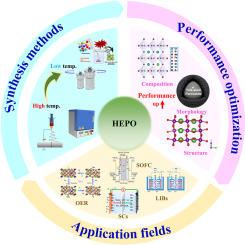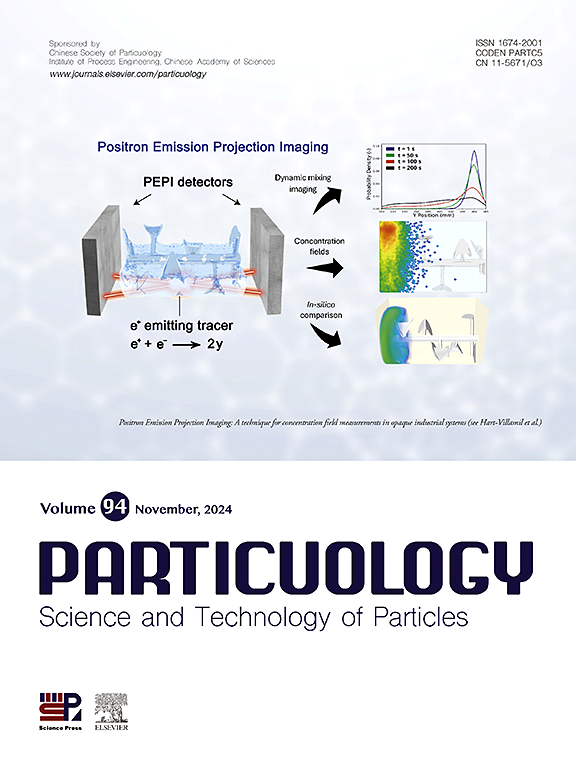Research progress of high-entropy perovskite oxides in energy and environmental applications: A review
IF 4.1
2区 材料科学
Q2 ENGINEERING, CHEMICAL
引用次数: 0
Abstract
To address the global challenges associated with energy and environmental concerns, the design, development, and application of novel materials have emerged as pivotal drivers. Notably, high-entropy perovskite oxides (HEPOs) amalgamate the merits of both perovskite oxides and high-entropy materials, presenting significant potential in addressing numerous critical issues in energy and environment. This review delves into the recent advancements of HEPOs in these domains. Firstly, it provides an overview of prevalent synthesis techniques for HEPOs, alongside two emerging low-temperature, eco-friendly methods. Subsequently, current strategies to optimize the performance of HEPOs are summarized from three perspectives: compositional engineering, morphological engineering, and structural engineering. The review further underscores their applications in areas such as lithium-ion batteries, supercapacitors, electrocatalysts, and solid oxide fuel cells. Based on this foundation, potential performance optimization strategies and potential application areas of HEPOs are discussed. Finally, it identifies challenges faced by further development of HEPOs in energy and environmental applications and provides an outlook on future developments.

高熵过氧化物在能源和环境应用中的研究进展:综述
为应对与能源和环境问题相关的全球性挑战,新型材料的设计、开发和应用已成为关键驱动因素。值得注意的是,高熵包晶氧化物(HEPOs)融合了包晶氧化物和高熵材料的优点,在解决能源和环境领域的众多关键问题方面具有巨大潜力。本综述深入探讨了 HEPOs 在这些领域的最新进展。首先,它概述了 HEPO 的主流合成技术,以及两种新兴的低温环保方法。随后,从成分工程、形态工程和结构工程三个角度总结了当前优化 HEPO 性能的策略。综述进一步强调了它们在锂离子电池、超级电容器、电催化剂和固体氧化物燃料电池等领域的应用。在此基础上,讨论了 HEPOs 的潜在性能优化策略和潜在应用领域。最后,报告指出了在能源和环境应用领域进一步开发 HEPOs 所面临的挑战,并对未来发展进行了展望。
本文章由计算机程序翻译,如有差异,请以英文原文为准。
求助全文
约1分钟内获得全文
求助全文
来源期刊

Particuology
工程技术-材料科学:综合
CiteScore
6.70
自引率
2.90%
发文量
1730
审稿时长
32 days
期刊介绍:
The word ‘particuology’ was coined to parallel the discipline for the science and technology of particles.
Particuology is an interdisciplinary journal that publishes frontier research articles and critical reviews on the discovery, formulation and engineering of particulate materials, processes and systems. It especially welcomes contributions utilising advanced theoretical, modelling and measurement methods to enable the discovery and creation of new particulate materials, and the manufacturing of functional particulate-based products, such as sensors.
Papers are handled by Thematic Editors who oversee contributions from specific subject fields. These fields are classified into: Particle Synthesis and Modification; Particle Characterization and Measurement; Granular Systems and Bulk Solids Technology; Fluidization and Particle-Fluid Systems; Aerosols; and Applications of Particle Technology.
Key topics concerning the creation and processing of particulates include:
-Modelling and simulation of particle formation, collective behaviour of particles and systems for particle production over a broad spectrum of length scales
-Mining of experimental data for particle synthesis and surface properties to facilitate the creation of new materials and processes
-Particle design and preparation including controlled response and sensing functionalities in formation, delivery systems and biological systems, etc.
-Experimental and computational methods for visualization and analysis of particulate system.
These topics are broadly relevant to the production of materials, pharmaceuticals and food, and to the conversion of energy resources to fuels and protection of the environment.
 求助内容:
求助内容: 应助结果提醒方式:
应助结果提醒方式:


